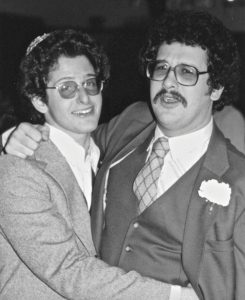While growing up in an immigrant family, I had a job: explain America to my parents. They didn’t understand Americans. The assumption was that I, with fresh eyes, could do a better job of it. I also served as the family’s translator of impenetrable American accents, usually Southern.
According to my parents, Americans were lazy intellectually and physically, soft, undisciplined, mouthy, ridiculously optimistic, naive, superficially friendly, unserious, emotionally cold and disloyal to their own families. The assumption was that you couldn’t trust Americans not because they were dishonest, but because they were incompetent. My parents didn’t understand America, but they did believe they understood the character of Americans, which was awful, and as parents their number one goal was simple: their children would benefit from the wealth of America but avoid its defective character. The worst insult my parents could level at me was, “You’re behaving like an American!”
I took my job as the explainer of America seriously. Like de Tocqueville over a century before, I carefully observed the America I saw. I took mental notes. Americans, I noted, were incredibly individualistic. You couldn’t get them organized in group activities that weren’t sports, no way, no how. As a kid, I’d hear Sinatra on the radio sing I Gotta Be Me and think that that was America in a nutshell. Everybody has Gotta Be Me. Our cities look like crap. Nothing runs on time. Our parks have trash strewn everywhere. Everybody is their own king. Our selfishness and radical individualism are even written into our Declaration of Independence:
“all men are created equal, that they are endowed by their Creator with certain unalienable Rights, that among these are Life, Liberty and the pursuit of Happiness.”
This statement by Thomas Jefferson is a lofty way of saying that America should be about me, me, and me. From day one of our country, we were told to be selfish a-holes. Contrast that with the French “liberté, égalité, fraternité!” Fraternity is just not an American thing.
Scholars far more serious and learned than I am have noted how the Enlightenment in the West championed and defined the rise of the individual over community. America took it one step beyond. We went maximum I. Everything in America was about the individual and our radical individualism, our hatred of government and community, define our character and define what we consider our exceptionalism.
It turns out that creating a nation of radical individualists comes with some advantages. It means that those individuals, suffused with egotism, will tend to be incredibly good at innovation and making things. That’s what America does better than anyone else. We win Nobel Prizes so frequently that the Nobel Prize committee might as well move their ceremonies and offices from Stockholm to New York City to save on travel. That many of those “American” Nobel Prize winners are immigrants means that not only do we breed radical individualists, but we attract them as well. My father, for example, hated Americans, but he loved how America let him do what he wanted when he wanted to do it. My father’s favorite song? Sinatra’s My Way, which he would belt out in our home in full voice not infrequently.
Being radical individualists means we create with ease world beating companies led by billionaires. America is where money is made, more money than anywhere else.
But the American exceptionalism of radical individuality comes with a price. Our communities are at best ragged affairs. Health care? It’s not for everyone. Shelter? Not for everyone either. Disparity between the rich and poor? Off the charts. And when we are required to do something that demands community and self-sacrifice we are going to fail at it. America, the land of Maximum I, is just not built for such an effort.
The failure of America to deal effectively with the coronavirus and COVID-19 has flummoxed many observers. How could a country so powerful and wealthy be taken down by a virus? Much of the blame for this failure has been assigned to our leadership, in particular Donald Trump. Yes, Donald Trump has been horrible at leading us through this disaster. But I try to imagine another leader trying to get Americans to wear masks and I come up empty. I try to imagine another leader trying to get Americans to not hit the bars and beaches and I come up empty as well. Obama would have done better, sure. But I have no doubt that America would still be a COVID-19 hell.
I think of my parents and what they would say about COVID-19 in America if they were still alive: Americans, what do you expect? Soft, undisciplined and selfish. America’s failure would confirm their bleak view. I think of the look my mother gave me when I asked her why she didn’t say yes to the marriage proposals from American Jewish soldiers in Europe after the war, the pure derision on her face. “Why would I have wanted to marry one of those babies?”
I didn’t agree with all of my parents’ litany about Americans. Dumb is everywhere. America doesn’t own stupidity. I’d have arguments with them about their anti-American attitudes. But I look at what America has done during this pandemic. No preparations. No medical safety equipment at the beginning, equipment that is still hard to obtain. No N95 masks for its citizens, who have to walk around with homemade cloth things instead. For thirty days or so, most Americans made an effort to “flatten the curve” and then many decided, fuck it, this is too hard.
In contrast Western Europe, the source of modern individualism, screwed up its initial response, but got disciplined in a hurry and at least temporarily brought its infections and deaths down. Asia, where community is more important than it is in the West, quickly worked to keep infections low from the start.
We are probably at the 20% mark of this pandemic. We have at least another nine months before we have a vaccine, probably longer. In America over the months ahead it will be every person for him or herself. That’s how America works. That’s part of its exceptionalism. It’s an exceptionalism that may well produce a breakthrough in therapeutics. It’s an exceptionalism that may well produce a rapid vaccine. But it’s also an exceptionalism that treats the death of its own citizens with frightening callousness.




Recent Comments